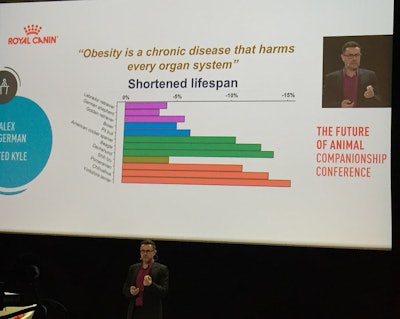
Obesity, whether in pets or humans, is a chronic disease that affects every system of the body, and chronic diseases cannot be cured. The need to recognize and acknowledge that fact was a key message from Alex German, Ph.D., professor of small animal medicine at the University of Liverpool, and Ted Kyle, R.Ph., pharmacist and healthcare innovation professional with ConscienHealth, during a joint presentation at Royal Canin’s Future of Animal Companionship Conference on October 24 in Paris.
Both experts also pointed out that stigma about obesity and overweight has not helped efforts to address the issue. “In the U.S., the issue has been driven by a societal tendency to focus on individual responsibility,” said Kyle, presenting on human obesity. He explained that this attitude is starting to shift, however, as people are understanding the situation is much more complex and that genetics plays a significant role.
As for pets: “Weight bias gets in the way of progress,” said German, adding that less data on pet obesity has hampered efforts, too, though there is growing evidence of the health effects of the disease on dogs and cats. That’s also true with life span: German said a new, “hot off the press” study from the Waltham Centre for Pet Nutrition, using data from Banfield Pet Hospitals (both are divisions of Mars, as is Royal Canin), shows life span can decrease from 3 percent to more than 15 percent in dogs, depending on the breed (see photo above).
How can pet obesity be addressed and improved?
Aside from the warnings and concerns, German’s presentation was focused on recommendations for addressing pet obesity:
- Clinically and formally define obesity as a disease. This is happening in human health but has lagged for pets, German said, though efforts are under way. A new initiative, the Global Pet Obesity Position Statement, has been endorsed by veterinary organizations such as the American Veterinary Medical Association, British Veterinary Association, BSAVA and, just the day before the conference, the American Academy of Veterinary Nutrition, according to German.
- Improve communication about obesity, especially with veterinarians. German cited data from a study of veterinary records in the U.K. conducted by his team showing that veterinarians’ comments on patient visits used the terms “overweight” and “obese” less than 1 percent of the time — even though 50 to 60 percent of dogs in the U.K. are known to be obese. This could be due to bias, German said. Another problem is that even when vets recognize obesity in a pet, they don’t have the tools or confidence to have a difficult, “stigmatizing” conversation with the owner. The solution? Industry and academia should offer training to vets on how to have these conversations in a non-stigmatizing way, including through the use of technology such as the ChangeTalk app.
- Redefine weight loss goals. Because obesity is a chronic disease, it is difficult to treat long-term, German said; weight loss is often rapid at first, then plateaus. The same is true for owner compliance with weight loss programs for their pets. Rather than focus on numbers such as rate of loss, pounds to lose or ideal weight goal, German recommended focusing on benefits, such as making a lame dog more mobile. “This is much more achievable, shorter and more pragmatic, focusing on the first 12 weeks,” he said. He cited another new study, this one by Royal Canin, documenting that even a 6 to 9 percent loss of weight can significantly improve lameness in dogs and cats.
- Develop more evidence-based strategies on preventing obesity. This is also needed in humans, German commented; with pets, it should start with kittens and puppies since obesity often begins early in a pet’s life.
- Change our language about obesity, for pets and humans. “We don’t say, ‘So-and-so is cancer’; we say they have cancer,” German said. “We need to do the same with obesity.”
















